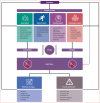Frailty and Heart Failure: Clinical Insights, Patient Outcomes and Future Directions
- PMID: 40083651
- PMCID: PMC11904417
- DOI: 10.15420/cfr.2024.34
Frailty and Heart Failure: Clinical Insights, Patient Outcomes and Future Directions
Abstract
Frailty is common among heart failure (HF) patients and linked to increased risk of adverse outcomes. Contributing factors include inflammation, sarcopenia and neurohormonal issues which diminish physiological reserves and accelerate the decline of health. Managing frailty in HF requires a multidisciplinary approach to address physical, nutritional and pharmacological needs. Structured exercise and dietary support can improve physical function, while careful medication management, especially with polypharmacy, reduces frailty-related risks. Telemedicine and wearable tech facilitate continuous monitoring and timely intervention, especially for those in remote areas. Future research should develop standardised frailty assessment tools specific to HF, enhancing risk stratification and personalised care. Studies on underlying mechanisms, such as inflammation and mitochondrial dysfunction, could lead to new therapies. Addressing socioeconomic factors can also improve care equity. This review summarises the mechanisms, clinical characteristics and impact of frailty on HF, highlighting challenges in treatment and opportunities for improving patient outcomes.
Keywords: Frailty; frailty syndrome; heart failure; inflammation; sarcopenia; telemedicine.
Copyright © The Author(s), 2025. Published by Radcliffe Group Ltd.
Conflict of interest statement
Disclosure: IU is on the Cardiac Failure Review editorial board; this did not influence peer review. All other authors have no conflicts of interest to declare.
Figures
References
-
- World Heart Federation. World heart report 2023: full report. 2023. https://world-heart-federation.org/resource/world-heart-report-2023/ (accessed 30 October 2024)
Publication types
LinkOut - more resources
Full Text Sources
Research Materials
Miscellaneous


